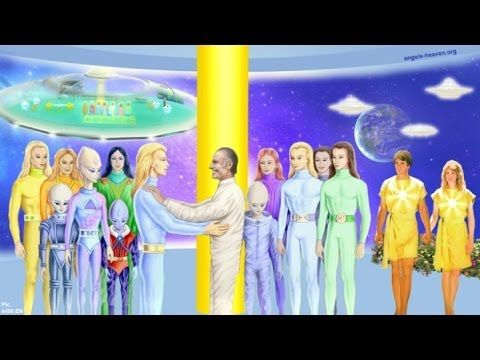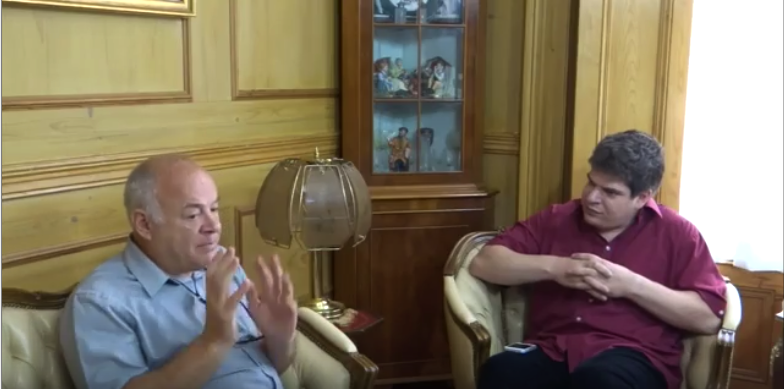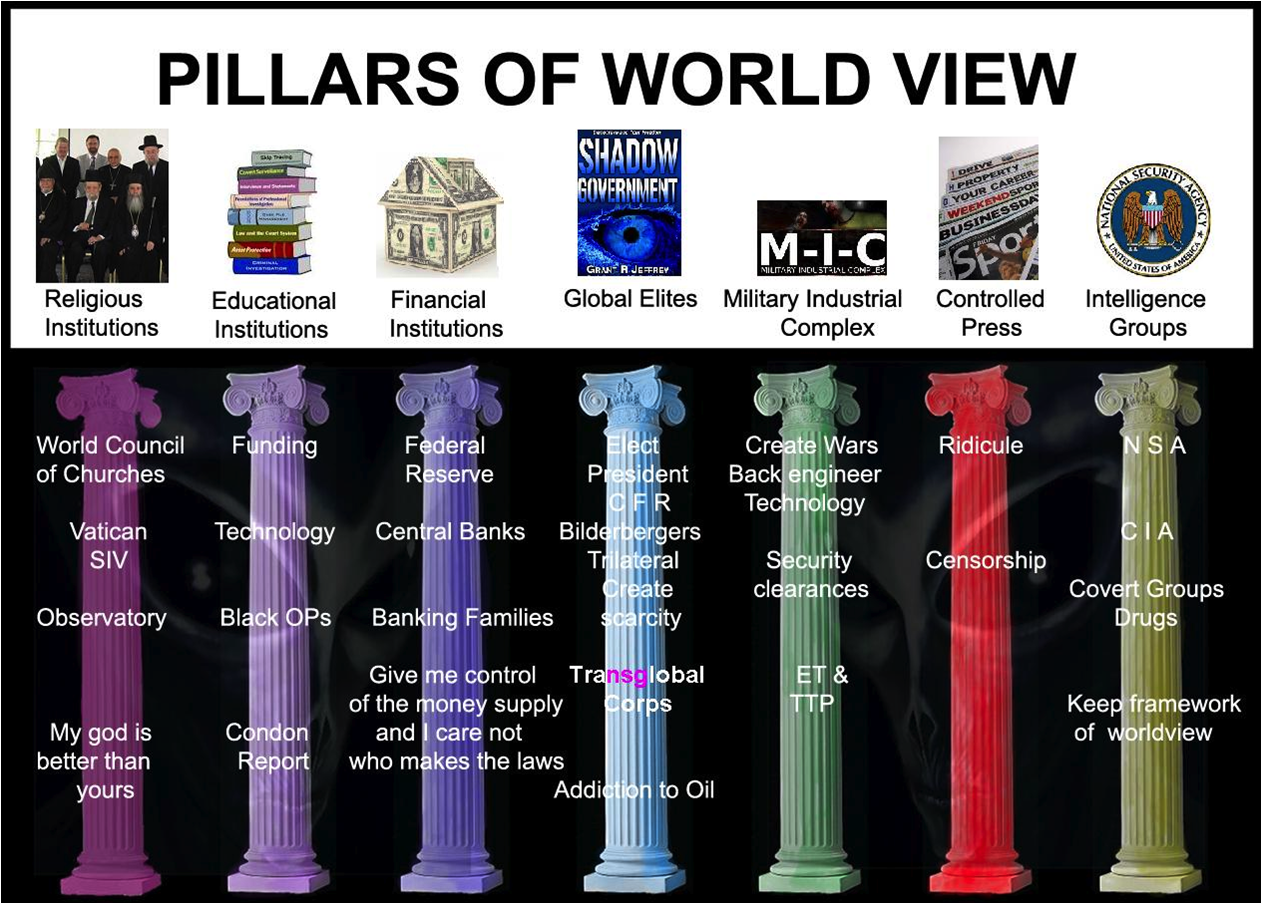
Madonna with Saint Giovannino, 15th Century, attributed to Jacopo dell Stellaio or Sebastiano Mainardi, at the Sala d’Ercole, Palazzo Vecchio, Florence, Italy. Is the discoid object in the background a 15th Century structured, unidentified flying vehicle or is it simply an allegory?
Can exopoliticians orient major religious institutions if intelligent extraterrestrial life is publicly verified in a way that cannot be rationally denied? We need to know something about theological thinking outside conspiracy theories.
Our exopolitical thinking requires fine-tuning regarding how we understand major institutions such as the Catholic Church. Thus far, this church has had many progressive, open-minded proponents that reconciliate faith and the possibility of finding intelligent extraterrestrial civilizations.
Ted Peters, a professor of systematic theology at the Graduate Theological Union found in a landmark survey that the leaders of several well-known religious institutions (especially conventional and moderate ones) felt at ease with the possibility of discovering an intelligent extraterrestrial presence and I don’t think that most of the intellectual and theological leaders within the Vatican curia and the Roman Catholic Church in general would be any different. Retrieve his explanation at https://www.youtube.com/watch?v=4Vy9y3-jW7I
When I asked Jesuit brother Guy Consolmagno (astronomer from the Vatican Observatory, curator of the Vatican’s meteorite collection and author of “Would you Baptize an Extraterrestrial?” if he was aware of the possibility the Church is preparing for discovering ET life, ET contact happening right now or even disclosure he said that – judging from a few direct interactions with the highest Pontiff – he surmised that the Pope (back then Benedict VI) most likely wasn’t particularly interested in the ET subject. That was a bit of a cold shower, especially coming from one of the men that affirmed that, if an intelligent, rational extraterrestrial requested baptism, he would baptize him. His book “Would you Baptize an Extraterrestrial” is kindly and emphasizes (in Aristotelian and Thomas Aquinas fashion) the importance of rational capacity.
Pope Francis I also seems to share the idea that he would baptize an ET given the conditions Guy Consolmagno refers to. But we must realize that this has already been thought by theologians in the Catholic Church before and – however important – doesn’t qualify as an astounding “new concept.” The important detail is that they do not find an essential contradiction between discovering intelligent extraterrestrials and the faith or doctrine and this is a favorable position in terms of the possibility of disclosure. The fact that it has often been said that “religions would crumble” if the truth be known may not be as clear-cut as is often simplistically assumed.
Please go to this link:
http://www.christianpost.com/news/pope-francis-talks-about-aliens-says-he-would-welcome-martians-to-receive-baptism-119630/
It is well-known that the main astronomer at the Vatican Observatory, Father Gabriel Funes, also accepts the possibility of extraterrestrial life (albeit he doesn’t seem to believe it is going to be discovered soon) and that he holds a conservative theological position about Christ’s only incarnation on Earth as a one-time event valid for the whole universe. Each time he has said anything about this there’s been much speculation and has been interpreted as if the Church were secretly preparing for disclosure or (now that Funes said he doubted ET life would be discovered soon) that – until a gradual educational campaign took place – there were reasons for still keeping it under wraps.
While it is reasonable to posit that some within the curia should know more and deal with the ET subject, it seems that many or most of the public figure leaders are kept “out of the loop” besides, quite simply (as most politicians and academics elsewhere) not being personally inclined to find out or to know more. Moreover, if those “in the know” would have psychologically denied, suppress or repress actual knowledge of ET life on Earth and thus preferred not to have known, and if they are currently making important exopolitical decisions representing a citizenry (and perhaps us all), they may not be the right persons to do it…and they may naturally extend that distaste for challenging truth by ridiculing/de-legitimizing the situation, generating doubt, confusing information and keeping us from clearly knowing about it. It would be a psychological projection onto us, perhaps acting like “social superegos” to keep us from knowing. Just like they were not ready to know about it when they were “briefed” they project onto us assuming that we would not be able to handle it).
I think that the need to control the truth is not just a psychological projection but also largely linked to a traditional way of thinking and being in the world, a win-lose, dichotomous, two-value way of processing information, feeling and judging; one closely associated with survival instincts adequate for a physical world limited to classical laws. The ET truth challenges that increasingly outmoded, crude, physical survival-based way of thinking which is also present in a theology that emphasizes God as a thoroughly independent and distant-transcendental, perhaps authoritarian, be saved or condemned, strict, law-giving Father figure.
That said, there also are good indications that “special” statements by influential Church representatives have at least been allowed by “those in the know” to continue for some time; the most notable being those repeated statements by Monsignor Corrado Balducci who was allowed to continue speaking theologically about the hypothetical position occupied by (at least some) extraterrestrial beings in the order of creation. Balducci, exorcist, theologian and personal friend of Pope John Paul II affirmed during several interviews in the 1990s that the experience of people having contacts with extraterrestrials is real and that we should respect human testimony much more.
Having had some priest friends from different orders I think that, generally speaking, they – especially encumbered priests – have enough respect from their superiors and personal freedom to be able to speak their own opinion regarding ET life if need be…especially if that doesn’t contradict Church teachings. And for the most part, speaking about intelligent extraterrestrial beings has become a respectable (even if still interspersed, partly avoided and somewhat controversial) tradition.
Theology About Extraterrestrials
For instance, upon researching a little bit, I found that considering extraterrestrials is not something new. Influential Catholic theologian and priest Karl Rahner uses the term “Star Inhabitants” admitting the possibility of other salvation stories and multiple incarnations of the Word.
Influential Catholic theologian and priest Hans Kung also wrote that the possibility of other intelligent life in the Universe had to be granted.
XV Century Franciscan theologian, defender of Duns Scottus’ theology Guillaume de Vaurouillon proposed that Jesus Christ’s sacrifice had a universal value, in case other rational, intelligent beings exist in the cosmos.
The Dominican friar and renowned theologian Thomas O’Meara considers in his works titled “Vast Universe” and “Christian Theology and Extraterrestrial Life” that Thomas Aquinas left the door open for the possibility of a Holy Person of the Trinity to extend salvation to other intelligent beings in the Cosmos and that we shouldn’t limit what the divine can or cannot do, including the possibility of a further divine incarnation. You can read O’Meara’s “Christian Theology and Extraterrestrial Life” at http://cdn.theologicalstudies.net/60/60.1/60.1.1.pdf
Back in the Middle Ages, Dominican friar Tommaso Campanella said that extraterrestrial civilizations would not have suffered from “original sin” but perhaps of another type of sin proper to them. Tommaso Campanella, along with another Dominican friar, Giordano Bruno were some of the proponents of the “plurality of worlds.” For some of his views, Bruno was burned at the stake but the Church has recognized that as a mistake.
The Jesuit priest Domenico Grasso theologian at the Pontificial University of Rome said “Why would all the perfection that God granted so vastly to the universe be hidden without declaring His glory? Who writes a book that is never going to be read?” He also mentioned famous German theologian and Dominican priest Joseph Pohle who in 1904 wrote “Celestial Worlds and Their Inhabitants.”
Father Pohle wrote, “It seems that the purpose of the universe is for its celestial bodies to be inhabited by beings that reflect God’s Glory in the beauty of their bodies and worlds just as man does it in a limited way in his world.” Commenting on that position Domenico Grasso adds “But these are not angels since angels are pure spiritual beings and can only perceive matter indirectly, just as we can only perceive the world of spirit indirectly.”
As a comment, I’ll add that, here a distinction is being made between “pure spirits” or incorporeal angels and other types of material beings. And, technically-speaking, since humans can also be considered as material “angels” in the sense of messengers doing good and acting in the name of God, technically-speaking this could be extended to at least some possible extraterrestrial varieties according to their orientations and actions.
XIX Century erudite priest Januarius de Concilio in his book “Harmony Between Science and Revelation” also wrote in favor of extraterrestrial beings as creatures “with intelligent substances united to some type of body.”
Father Theodore Zubek in his article “Theological Questions on Space Creatures”published in 1961 The American Ecclesiastical Review said that the extraterrestrial beings not mentioned in the Holy Scriptures are also not forbidden by them. This recognizes that many things that can be discovered are not necessarily mentioned in the Bible nor precluded by it. Zubek posited that extraterrestrial beings not descending from Adam and his sin would not inherit original sin.
The Dean of the “School of Sacred Theology” of Catholic University, Father Francis J. Connell wrote the essay titled “Flying Saucers and Theology” and said, “It is good for Catholics to know that the principles of their faith are entirely compatible with the most incredible possibilities about life on other planets.”
Sor Ilia Delio, a Franciscan nun, theologian, and scientist accepts the likely extraterrestrial presence in the cosmos and tries to reconcile this and science with faith by creating a new cosmology which she calls “EXOCHRISTOLOGY.” Please read “Christ and Extraterrestrial Life” http://www.michaelsheiser.com/UFOReligions/Christ%20and%20ET%20Life.pdf and see “The Christian Life in Evolution” (video en inglés): https://www.youtube.com/watch?v=CDRvaqUjJkI
Vatican astronomer and theologian Giuseppe Tanzella-Nitti said that “Chirstias do not have to renounce their faith in God because of unexpected information of a religious nature regarding extraterrestrial civilizations.”
Father George Coyne SJ, former Director of the Vatican Observatory asked why wouldn’t God also save extraterrestrials from sin.
Attorney Daniel Sheehan who was General Counsel for the Jesuit Order in the U.S. between 1975-1977 recently predicted that the Vatican would disclose knowledge of an extraterrestrial presence after Pope Francis “Laudato Si” encyclical focused on protecting the Earth ‘s life forms and ecology and condemning excessive, abusive capitalism. His prediction was misstated as saying that he knew the Pope would disclose the ET presence in June 2015. It was confounded with Mr. Sheehan also speaking about the Jesuit’s general scientific and theological “call” to prepare for the probable discovery of life outside Earth (one of the reasons for which the 2009 astrobiology conference was organized by the Pontificial Academy of Science and the Vatican Observatory). Mr. Sheehan is quite actively participating with New Paradigm Institute in which theological ecumenical conversations preparing for the eventual confirmation of intelligent extraterrestrial presence are taking place.
“The Octave of Worldviews and the Philosophical, Theoretical and Public Policy Implications of Extraterrestrial Contact by Daniel Sheehan”: https://es.scribd.com/document/313807825/Daniel-Sheehan-Implications-of-Extraterrestrial-Contact-New-Paradigm-Institute
The following is an interesting conference by Mr. Sheehan about his involvement with the UFO subject and the preceding issues https://www.youtube.com/watch?v=B4O55wKY-xg
Whether the Church (does anyone represent “The Church” as a whole?) is – under some circumstances – speaking about human-type aliens, I don’t know but I doubt it. Perhaps contactee and mystic George Adamski did indeed meet with Pope John XXII as he claimed and perhaps that Pope indeed met with human-looking extraterrestrials as his personal secretary Loris Francesco Capovilla is reported to have reminisced, but I don’t have the actual source of that information.
Some Personal Evolving Evaluations
I do NOT think that “Jesus was an extraterrestrial” or that “extraterrestrials are going to replace God” or easily accept similarly superficially said blanket statements about the theological implications of discovering extraterrestrial life and – in particular – intelligent, rational, technological extraterrestrial life (however advanced they might be with respect to us). Instead, I think that we need to think more carefully about all these matters. We need to learn to think integratively, with greater nuance, finding a shared essence, shared metaphysical principles, common patterns, connecting (not reducing or subsuming the major tenets of spiritual traditions) under an integrative methodology.
What I agree along with some other theologians is that articles of faith will not be thrown into the bin. Instead, they would expand and mature in order to include the discovery of rationally intelligent extraterrestrial life and of other forms of life in general (a “second Genesis” even if not related to self-conscious, rational and technically proficient life?).
Even if it were true that extraterrestrials intervened our genetics in our past, that wouldn’t mean that they would replace God or that God doesn’t exist or that Creation didn’t happen because, as contingent beings, the former would act “in time” and the latter (GOD) “outside of time” or rather, “sub specie aeternitatis” (“under the category of eternity”). Thus, metaphysically-speaking, God (a lofty, non-dual, understanding of this term as Source of all being and existence) would have “created” and, still, continuously creates unchanged, “dreaming the cosmos” (Panentheistically and as per our mental understanding within time).
God would have also created extraterrestrials who may have the capacity to choose to forget their deepest connections with Source, thus to err or to “sin” with various degrees of depth (making spiritual mistakes) thus thinking or acting in ways that may strengthen or dilute their closeness to God.
They would certainly not be perfect and some would be closer to God’s ways than others but – logically speaking – all would truly be our brothers as other intelligent beings dependent on the same Absolute (our common Source) for their contingent existence. However, what would also have to be considered is (from a Catholic perspective) if “original sin” (beyond a literal interpretation) would only apply to Earth humans, to all other types of “humans” (beings capable of rational choice) in the Cosmos and furthermore, if the Logos only manifested in all the vastness of the Cosmos as Jesus Christ on Earth. Or perhaps, a Father Thomas O’Meara suggests we shouldn’t limit what the Logos can or cannot do, as the Logos can manifest/incarnate through any other limited rational being/also-spiritual-master-and-prophet (in human or perhaps even non-human form) as need be for the spiritual salvation of other specific planetary civilizations. Thus, in a way, the same reconnecting, salvific Intelligence manifesting through different relative, contingent rational vessels could be considered as applicable to extraterrestrial civilizations according to context as need be.
Perhaps some theologians would be able to uphold their faith while considering that the “angels” allegedly encountered by Abraham were flesh and blood and human-looking beings and not “pure spirits.” I don’t know but I truly hope so as many human-looking ETs (albeit not necessarily all of them) would (according to various contactees) make good friends of the Earth-human family. It would also be easier to initiate contacts with them. Furthermore, I hope that the likelihood of an actual extraterrestrial presence already on Earth is officially (rather than covertly) dealt with besides dealing with the extraterrestrial issues only being backed up by formal astrobiological discoveries.
In Catholic theology and in the theology of other monotheistic religions human creation is considered to be a unique event and in the Catholic tradition, a creation deserving “salvation” by God’s only begotten Son. But what is the deep meaning of “salvation? How far can our interpretations go? Can other beings – similar and not similar to the human form – be legally considered “human?”
If intelligent extraterrestrial life is discovered either through the exploits of astrobiology, contacteeism, SETI, official disclosure, grassroots contact and “citizen diplomacy” efforts or if “they” (the ETs) make themselves known, theology and doctrine will have to accommodate that reality. In doing so, a more common integrative ground will possibly have to be found sharing essential ideas from various religious doctrines and spiritual, scientific, esoteric and philosophical ideologies. A common basis will have to be found to coordinate apparently incommensurable ideas.
By reading the theological positions of several theologians as the ones previously listed, I think that (in case either “the Vatican,” another institution, world events or someone else of world recognition and stature reveals the extraterrestrial presence) the concept of humanity’s uniqueness, original sin, and the role of Jesus Christ’s “salvation” will have to evolve, include more, go to the utmost mystical depths of their dogmas and complexify, transcending monotheist Christian traditions and other monotheist traditions in order to allow a conversation integrative space for all benevolent spiritual earthly traditions, also considering the existence of extraterrestrials once it is also recognized that they are neither simply good or evil “pure spirits” nor that all of them are alike.
Regarding who is to be considered as “HUMAN,” the issue goes beyond biology and I think that several theologians (including Jesuit Brother Guy Consolmagno and Dominican theologian Thomas O’Meara, both inspired by Thomas Aquinas) would agree that it is alright to extend this category to extraterrestrials not only if they are rational but if – as children of the same Source – we and God can befriend, admire, respect and… LOVE them.
The Catholic Church, as well as its Vatican, is not a monolithic, single-headed organism (just like “the U.S.” and “Washington” aren’t) but they are often assumed to be so. After my experience as an advisor to an official institution, I’ve noticed that large, traditional state institutions are naturally and extremely easily found suspect of covering up the UFO phenomenon and the extraterrestrial presence. But the situation is, quite likely, more complex.
There’s a tendency to overgeneralize on all sides of the human political equation between and among political groups. Outsiders that feel that they are living to promote a non-orthodox cause (like some pro-disclosure activists, left-wing revolutionaries) also almost always speak of “the U.S.” as though it were a monolithic empire where most leaders confabulate to manipulate the rest of the world. But the trees are mistaken for the forest. In other words, as a tendency of the dichotomous mind, judgmental exaggerations about formal institutions of power are way easy to make when one is on the outside. As inheritors of a hunter-gatherer mindset, we tend to distinguish ourselves tribal-like from others in an exaggerated way.
I really suspect that elements within the Catholic Church are privy to information about the UFO and ET presence but, could it be like what the immensely dedicated disclosure and contactee Dr. Steven Greer tells in his lectures that, not even CIA directors are privy to the best information regarding UFO’s if they have no “need to know?”
Now let’s get a bit more philosophical and theosophical. Theoretically speaking, “the Church” is most essentially composed by all baptized individuals but the Vatican curia leads/orients them allegedly guided by the Holy Spirit as per its doctrine. However, if we consider that “the Vatican” or key members within also orient UFO research, its secrecy, considerations, and possible disclosure, I suppose that only a few high-ranking members would actually deal with these matters. They might be associated to the intelligence ranks within the Church.
This (parallel or included?) “special” social entity might be represented by those whose opinions would be relevant in case a massive, undeniable sighting were to occur. We may perhaps be referring to some of the most powerful decision-makers such as the Pope, or perhaps only to a few cardinals and bishops, or Jesuit priest researchers but I suppose that whoever really knows in a transnational sense in association with those in the known in Europe and the U.S. would need to have a “need to know” clearance. Following patterns from elsewhere, they might even be told that what they are participating in doesn’t officially exist.
So, perhaps asking who in “the Vatican” makes decisions above the official curia is like asking who rules the U.S. as per decisions being (perhaps extraconstitutionally) made about the extraterrestrial presence.
































